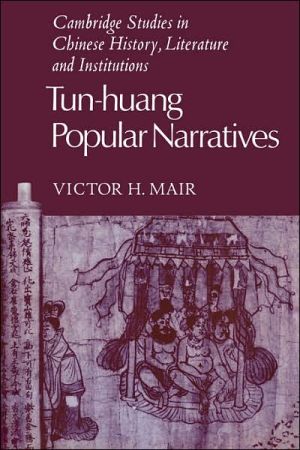

 |

|

The average rating for Tun-huang Popular Narratives based on 2 reviews is 4.5 stars.
Review # 1 was written on 2014-08-21 00:00:00 Kyle Jones Kyle JonesI read Tun-Huang Popular Narratives by Victor Mair yesterday. The books consisted of a short introduction to the manuscripts and a description of the type of tales that Mair translated. He translated 4 of these tales. The tales are viewed as popular narratives, stories that the monks read aloud to the public, though only half of the works had a Buddhist theme. The first story was adapted from a Buddhist sutra, "Transformation on the Subduing of Demons". It started with a search for the wife for the Prince, which changed into the need to purchase a garden for a monastery and finally a big magic battle. Looking for the garden was quite fun as they went to several "Inappropriate" gardens first. The battle at the end seemed a mixture of summoning and illusion and was fairly fun, and naturally the Buddhist won. The second story was my favourite. It was actually the "Transformation text of Mahamaudgalyayana Rescuing his Mother from the Underworld". I'd come across this story in Stephen Teiser's book on the Origins of the Festival of the Hungry Ghosts, he translated parts of the story there but this seemed to be a complete text. I know that 3 versions of this story survived in the Tun-Huang manuscripts however I'm not sure which version of the story this was. The story starts when Mahamaudgalyayana is a mortal, he leaves his mother and while he is away she is greedy and when she dies goes to hell. Mahamaudgalyayana becomes a monk after mourning for her for 3 years. Mahamaudgalyayana goes to Hell searching for his mother, as a result you have vivid descriptions of the Hells and the sufferings, as well as hungry Ghosts, and an interesting story. The story of Wu Tzu-Hsu is based on a Han history of the end of the Zhou period. It's interesting as it's not a Buddhist story and is about the period before Buddhism was popular. One thing that struck me particularly about this tale was the fact that the trouble all started when the Emperor took for a concubine the woman intended to be a wife for his son. Part of me wondered if the reason for including this tale was a reflection on Emperor Tang Ming Huang and his relationship with Yang GuiFei. The story was an interesting tale of a man out for revenge, the King killed his father and his brother. Interestingly the King had already died when he arrived in the Kingdom with his army and so had to kill the King's son and satisfy his vengeance on the King's corpse. Which were offered as sacrifices to his Father and brother. Another interesting fact of this story was that the stranger's who helped him all ended up committing suicide afterwards. And the story itself had a far from happy ending. The last story was "Chang I-Ch'ao" and seemed a fragment of a much longer tale of battle with the Uighars. This was interesting as later the Uighars took possession of Tun-Huang itself. But the stories were all very interesting. The style was a little hard to get into at first, it reminded me a little of the surreal quality of gilgamesh. But very enjoyable. I'm very glad to have been able to find this book. |
Review # 2 was written on 2018-12-11 00:00:00 Marilyn Kobulnicky Marilyn KobulnickyBest literature anthology ever made, reads like a book, makes you want to read the follow up. |
CAN'T FIND WHAT YOU'RE LOOKING FOR? CLICK HERE!!!